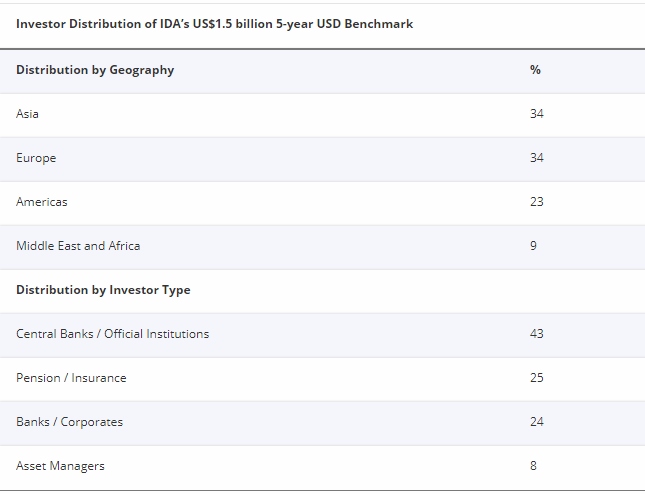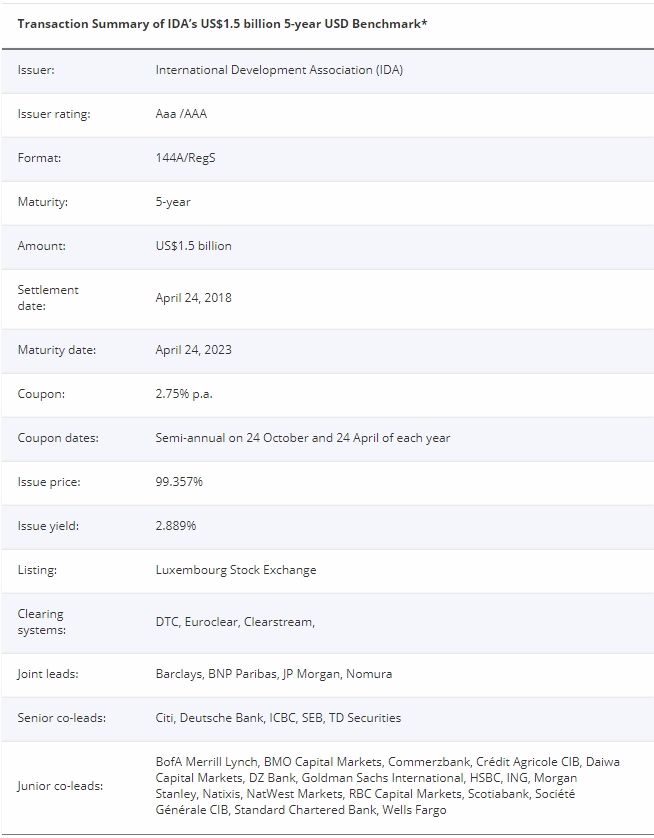IDA Makes Historic Capital Market Debut with Inaugural US$1.5 Billion Benchmark Bond: First IDA bond nearly five times oversubscribed
The International Development Association (IDA, rated Aaa/AAA), on April 17, made its debut in the capital markets, joining a select group of top-tier supranational issuers with an inaugural benchmark bond that raised US$ 1.5 billion on the back of an orderbook totaling US$4.6 billion from investors around the world. The 5-year bond marks the launch of IDA’s borrowing program.
The bond was announced early morning on April 16. Investors responded immediately with strong interest in the debut issue—reaching US$2 billion in the first few hours and exceeding US$2.8 billion by the end of the day.
Momentum carried on into the second day, with continued interest coming overnight from Asia and Europe. By the start of the New York trading hours on April 17 total orders for the bond had reached US$4.6 billion from 110 investors from 30 countries.
Final pricing was fixed at 19.6 bps over the 5-year U.S. Treasury, which resulted in a re-offer yield of 2.889% and re-offer price of 99.357% for the bonds.
The order book was of the highest quality, presenting an allocation challenge. As a result, the transaction increased from the initial target size of US$1 billion to a final size of US$1.5 billion. The distribution is:

IDA bond proceeds will support the financing of projects and programs in IDA eligible member countries that advance the Sustainable Development Goals, offering investors an efficient way to contribute to global development.
World Bank Group President Jim Yong Kim said: “The debut of IDA in the global capital markets is historic. While it is a new bond issuer, IDA is an established institution, with a 60-year track record as the leading source of development finance and expertise for some of the fastest growing economies in the world. As a borrower, it leverages its unrivaled capital position – the largest equity of any multilateral development bank – and decades of strong donor support, a solid track record of repayments, and prudent financial management. Today’s bond issue will allow IDA to tap into the power of capital markets to tackle some of the world’s biggest challenges and help millions lift themselves out of poverty.”
World Bank Vice President and Treasurer Arunma Oteh said: “IDA received a resounding response from the market for its debut issuance. Investors globally seized the unique opportunity to be the first to invest in IDA’s triple-A rated bond and make a positive impact in the lives of hundreds of millions of people around the globe. I want to thank investors, lead managers and all the bankers for their personal engagement and commitment to making IDA debut such a fantastic success. As we grow IDA’s borrowing program, we will continue to ensure a strong financial condition and prudent financial and operational management for IDA. We will also continue to put to work for IDA the World Bank Treasury’s 70-year track record of innovation in connecting capital markets with development.”
Barclays Group Chief Executive Officer Jes Staley said: “IDA has been at the forefront of global efforts to end extreme poverty and build shared prosperity for 60 years. Today marks a momentous step towards realizing that founding mission with IDA, once again, innovating on behalf of the countries which are most in need. The eventual impact of today’s inaugural bond will support countries to improve their own peoples’ access to water, education, healthcare and new road infrastructure. Given the scale of IDA’s future ambition, this is clearly the start of a new and exciting era for impact investing. Barclays is deeply proud to play its part.”
BNP Paribas Chairman Jean Lemierre said: “With ethical impact investing now established as a key investor requirement, future IDA issuance is a game changer as it will attract further investor demand. The financial sector has a key role to play in channelling private capital towards sustainable initiatives with a positive impact. These bonds support the broader collective effort to achieve the Sustainable Development Goals, and contribute towards the IDA’s vitally important mission of ending extreme poverty and promoting shared prosperity. As a company that has integrated the UN SDGs into its corporate objectives, BNP Paribas is delighted to be involved with this historic transaction.”
JPMorgan Chase Chairman and CEO Jamie Dimon said: “J.P. Morgan is honored to lead this debut bond issue and to support the International Development Association’s mission to reduce poverty in the world’s poorest countries by financing programs that boost economic growth, reduce inequalities, and improve living conditions. Our collaboration with the World Bank Group on launching this transaction for IDA represents yet another milestone in the long-standing partnership J.P. Morgan shares with the World Bank.”
Nomura Holdings Inc. President and Group CEO Koji Nagai said: “Congratulations to IDA and the World Bank team on the flawless execution of IDA’s inaugural bond issue and the highest profile new issuer event in recent times. Today’s successful issue will greatly increase IDA’s lending capacity to support the world’s 75 poorest countries. It is a welcome demonstration of how the global capital market can support sustainable social development in the world. Nomura is honoured to have had the opportunity to support this important initiative.”
IDA received its first-ever public credit ratings of Aaa/AAA (stable) issued by Moody’s and S&P in September 2016. IDA’s borrowing program is managed by the World Bank Treasury, which also manages the borrowing program for IBRD.
IDA has a nearly 60-year track record as the leading source of development finance and knowledge services for eligible countries. It provides technical expertise and low-cost financing for projects and programs that boost economic growth and reduce poverty in the world’s poorest countries— from tackling conflict, fragility and violence; forced displacement; climate change; and gender inequality to promoting governance, institution building, creating jobs and supporting private sector for economic transformation.

Source: World Bank
- 328 reads
Human Rights
Fostering a More Humane World: The 28th Eurasian Economic Summi

Conscience, Hope, and Action: Keys to Global Peace and Sustainability

Ringing FOWPAL’s Peace Bell for the World:Nobel Peace Prize Laureates’ Visions and Actions

Protecting the World’s Cultural Diversity for a Sustainable Future

Puppet Show I International Friendship Day 2020

